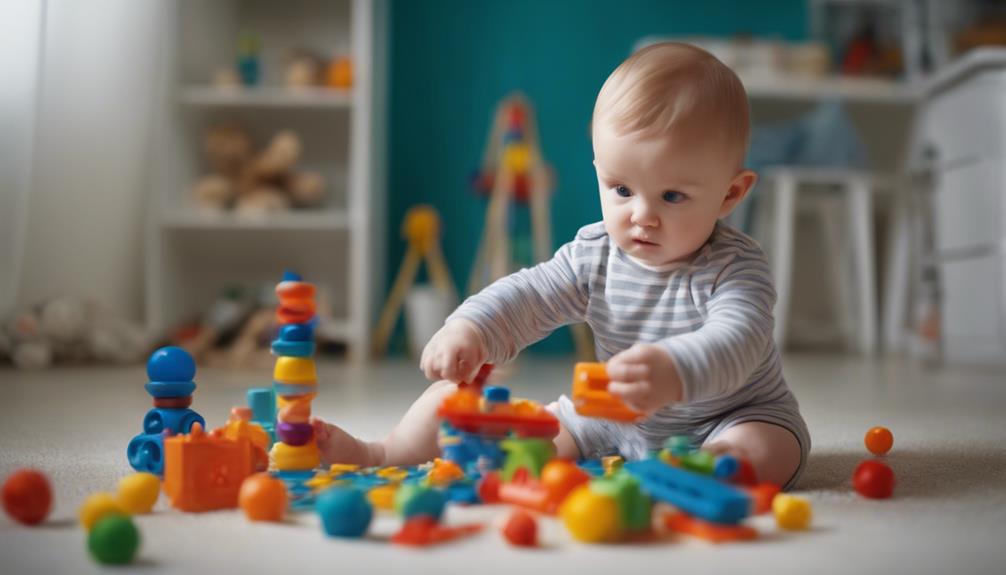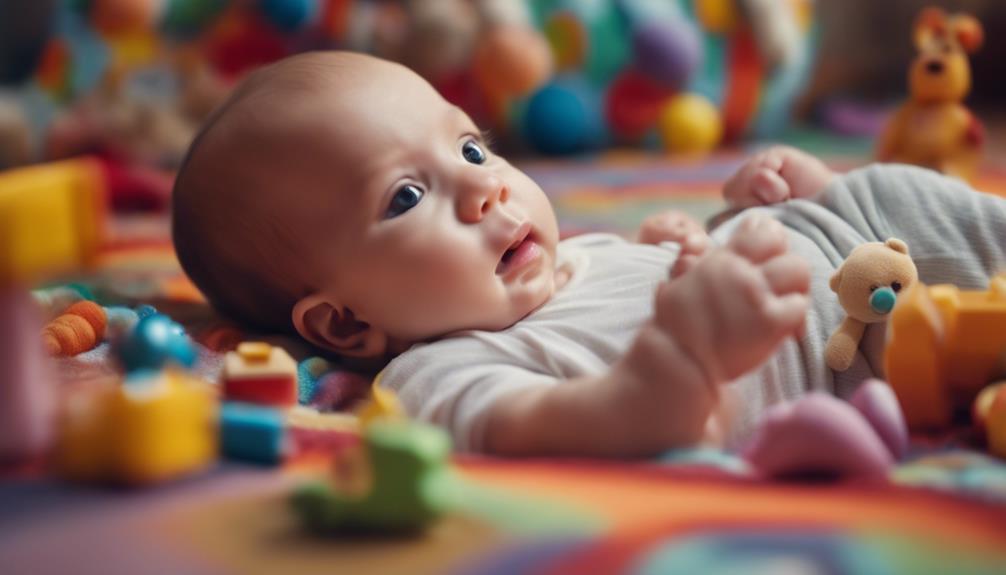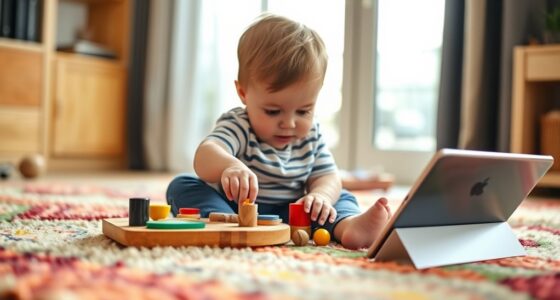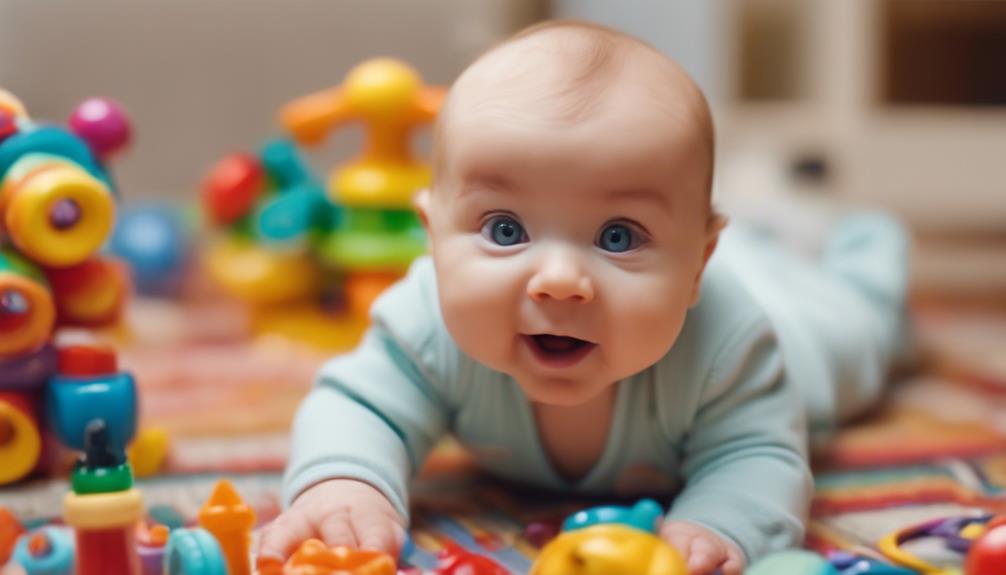Gifted infants often exhibit high levels of alertness, curiosity, and rapid cognitive development. You may observe their keen awareness, early achievements, and decreased need for sleep. Their desire for mental stimulation, delayed but sophisticated speech, and occasional restlessness when not mentally challenged are typical qualities. Consulting with specialists in pediatric psychology can provide valuable evaluation and personalized advice. Recognizing and nurturing these attributes in babies can help uncover their exceptional potential for the future.
Key Takeaways
- Exceptional alertness, curiosity, and rapid skill acquisition are common signs of gifted babies.
- Look for advanced cognitive abilities, intense focus, and a thirst for knowledge in gifted infants.
- Watch for unusual sleep patterns, heightened awareness, and early milestones achievements in gifted babies.
- Seek professional guidance for accurate evaluation and personalized learning plans for gifted baby development.
- Notice signs of mental readiness, intense curiosity, and preference for challenging activities in highly gifted infants.
Alertness and Wide-eyed
Gifted babies often exhibit exceptional alertness and are frequently born with their eyes wide open, showcasing a heightened awareness of their surroundings. This heightened alertness goes beyond just being awake more than asleep; it reveals a profound interest in the world they've entered.
These babies, with their wide-eyed gaze, seem to prefer staying awake, enthusiastically observing and absorbing the happenings around them. This behavior hints at a constant curiosity, a thirst for knowledge, and an active engagement with their environment.
Their wide-eyed nature isn't just a physical trait; it symbolizes a mental state of readiness to learn and explore. This heightened sense of awareness can open doors to early learning opportunities, allowing them to notice and comprehend complex concepts at a remarkably young age.
Gifted babies, with their alertness and wide-eyed wonder, are primed to navigate the world with a unique perspective, seizing learning moments and grasping the intricacies of life from the very beginning.
Early Developmental Milestones
As a parent or caregiver of a gifted baby, it's essential to monitor their developmental milestones closely. These milestones serve as signs of advancement and can provide valuable cues about your baby's unique abilities.
Understanding and recognizing these early indicators can help you support and nurture your gifted baby's rapid growth and development effectively.
Milestones to Monitor
When monitoring early developmental milestones in gifted babies, you should watch for advanced motor skills and language abilities that may surpass typical timelines. Gifted babies often demonstrate remarkable progress in areas such as motor skills and language development. Here are some key milestones to monitor in gifted babies:
| Motor Skills | Language Abilities |
|---|---|
| Sitting up alone at 4.9 months | Vocalizing different sounds at 1.61 months |
| Crawling upstairs by 10.5 months | Saying first words like 'Dada' at 5.53 months |
| Walking upstairs by 12.6 months | Developing a vocabulary of 4-6 words by 10.5 months |
| Forming 3-word sentences by 16.8 months |
These milestones can serve as early indicators of giftedness in babies. By observing and tracking these achievements, parents and caregivers can better understand the unique abilities and potential of their gifted baby. It is essential to provide appropriate stimulation and support to nurture these exceptional talents.
Signs of Advancement
Identifying signs of advancement in early developmental milestones can provide valuable insights into a baby's potential giftedness. Gifted babies often display advanced cognitive abilities and achieve early milestones ahead of their peers. For instance, sitting up alone at around 4.9 months and crawling upstairs by 10.5 months could indicate exceptional physical development.
Additionally, demonstrating early language skills such as forming 3-word sentences by 16.8 months or having a vocabulary of 4-6 words by 10.5 months may suggest heightened cognitive capabilities.
Fine motor skills like holding crayons adaptively by 7.7 months and gross motor skills like walking upstairs by 12.6 months are also early indicators of giftedness. Socially, a baby showing a social smile at 1.05 months and vocalizing different sounds at 1.61 months might be displaying advanced communication skills.
Gifted babies often have unique needs due to their rapid skill acquisition and exceptional memory retention compared to their peers. Monitoring these signs of advancement can aid in recognizing and nurturing the potential giftedness of a baby.
Gifted Baby Cues
During the initial stages of development, you may notice various cues that could indicate a baby's giftedness through their early milestones. Young gifted children often demonstrate advanced language skills, motor abilities, and problem-solving capabilities.
Parents of gifted kids might observe their little ones showing intense focus, insatiable curiosity, and a rapid grasp of new concepts. Sensitivity to stimuli like sounds, textures, or lights, along with a preference for intricate toys, can be early signs of giftedness in babies.
Additionally, high energy levels, exceptional memory retention, and a tendency towards perfectionism may also be evident in gifted infants.
To support the development of gifted babies, parents of gifted children should consider providing stimulating environments that encourage exploration and foster social interactions with intellectual peers. By recognizing these early cues and nurturing their natural inclinations, parents can help gifted babies thrive and reach their full potential in their developmental journey.
Less Sleep Requirement
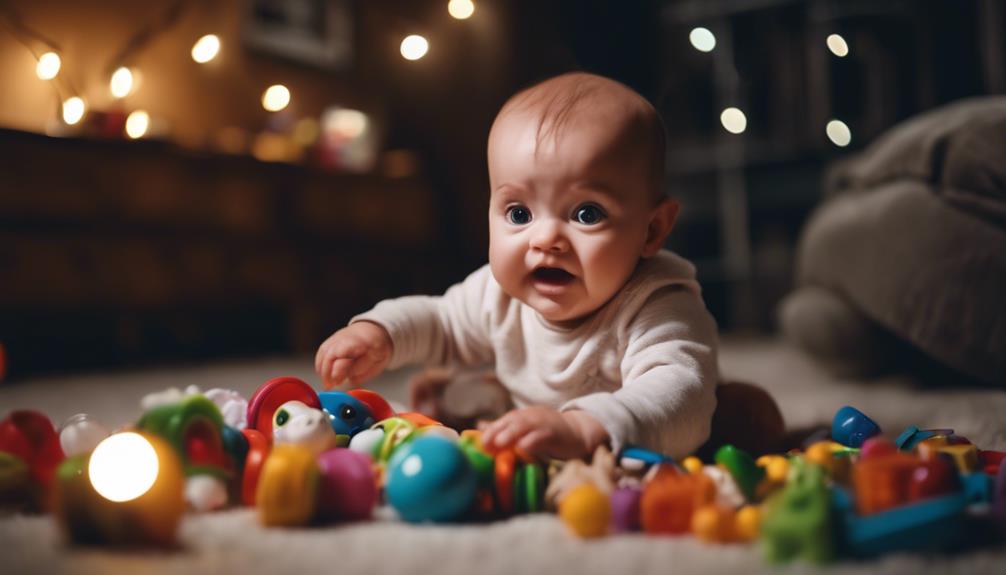
Gifted babies may exhibit unusual sleep patterns, characterized by less time spent sleeping and more time being awake and alert.
This decreased need for sleep is often accompanied by high energy levels, leading to restless behavior and resistance to naps.
Additionally, gifted infants tend to experience rapid cognitive development, which can contribute to their reduced sleep requirements.
Unusual Sleep Patterns
Some gifted babies may exhibit unusual sleep patterns, requiring less sleep than their peers. These babies might appear more alert and wide-eyed even from a very young age, hinting at their decreased need for sleep.
Parents may notice that their gifted infant resists naps or bedtime, staying awake longer than expected for their age group. It can be common for these babies to be consistently alert and active, even during times when other babies are usually asleep. This behavior can be attributed to their high energy levels and intense curiosity, which also influence their sleep patterns.
Understanding that gifted babies may have different sleep needs is important for parents to manage their expectations and support their child's development appropriately.
If you observe these unusual sleep patterns in your baby, it's essential to provide a safe and stimulating environment that encourages learning and exploration during their waking hours while ensuring they still get the rest they need.
High Energy Levels
You may notice that gifted babies with high energy levels require less sleep than their peers, often displaying alertness and engagement for longer periods. These infants exhibit increased restlessness and a constant need for stimulation due to their heightened energy levels. They might resist naps or bedtime routines, preferring to remain active and explore their surroundings. Parents may observe their gifted baby's ability to stay awake and alert for extended periods without showing signs of fatigue.
This heightened energy can lead to a preference for activities that challenge their minds and bodies. Gifted babies with high energy levels thrive on interaction and mental stimulation, seeking opportunities to engage in tasks that keep them mentally and physically active.
As a caregiver, it's essential to provide an environment that nurtures their curiosity and supports their need for continuous mental and physical engagement.
Rapid Cognitive Development
Experiencing rapid cognitive development, gifted babies often require less sleep than their peers due to their heightened mental activity and curiosity. Their highly gifted minds are in a constant state of exploration and learning, leading to decreased sleep requirements. Gifted babies' intense focus on processing information can keep them awake longer, as they delve deep into their intellectual pursuits. This reduced need for sleep is a common characteristic of highly gifted infants, who exhibit remarkable alertness and activity levels. Parents may observe their gifted baby being more engaged and curious, requiring less sleep to satisfy their insatiable thirst for knowledge.
| Cognitive Development | Highly Gifted | Characteristics |
|---|---|---|
| Rapid learning | Intense focus | Curiosity |
| Heightened mental activity | Decreased sleep requirements | Intellectual pursuits |
| Deep processing of information | Remarkable alertness | Insatiable thirst for knowledge |
Need for Mental Stimulation
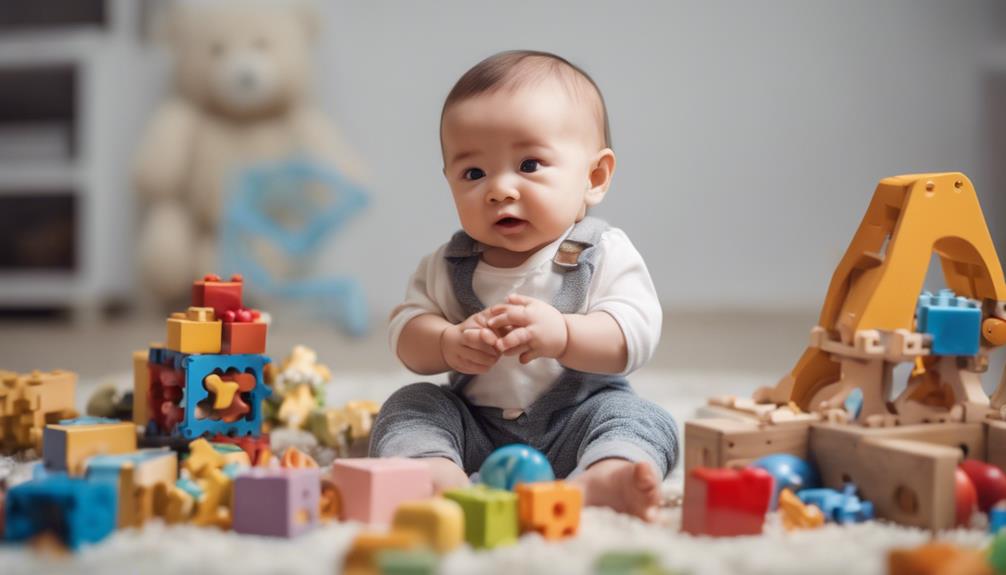
Gifted babies exhibit a heightened craving for mental stimulation from a very young age. Their need for mental stimulation is a key indicator of their intellectual development and cognitive growth. Gifted infants often show signs of becoming quickly bored with repetitive or simplistic activities, seeking more engaging and challenging experiences to satisfy their curious minds.
Providing a diverse range of stimulating activities such as educational toys, books, and interactive play can help nurture their cognitive abilities. These babies may display a strong desire to explore their environment in depth, driven by an intense curiosity that sets them apart in their need for mental challenges.
Delayed Speech, Complete Sentences

When observing gifted babies, one intriguing aspect to note is their tendency to display delayed speech, which often evolves into using complete sentences once they start vocalizing.
Gifted children may experience delayed speech compared to their peers, but this delay can be a sign of advanced cognitive development.
It isn't uncommon for gifted toddlers to skip the early babbling phase entirely and progress directly to forming complete sentences.
The delay in speech development in gifted babies is typically compensated by their ability to express complex thoughts and ideas once they begin speaking.
Parents of gifted babies shouldn't be overly concerned about delayed speech, especially if their child demonstrates advanced language skills when they do start vocalizing.
This progression from delayed speech to using complete sentences showcases the unique communication development of gifted children and highlights the importance of recognizing and nurturing their exceptional abilities in language acquisition.
Fussiness Without Stimulation
In the absence of sufficient mental stimulation, gifted babies may exhibit signs of fussiness due to their heightened curiosity and need for constant mental engagement. This fussiness can be a result of their craving for intellectual challenges and varied activities to prevent boredom.
It's essential to recognize that this behavior is a common trait among gifted babies who thrive on continuous mental stimulation. To address this, providing a stimulating environment with a diverse range of activities can help alleviate the fussiness associated with their need for mental engagement.
By observing and responding to these signs of fussiness without appropriate stimulation, parents can better cater to the unique needs of their gifted babies. Understanding the importance of creating a stimulating environment for these babies is key in fostering their intellectual growth and overall well-being.
Seeking Professional Guidance
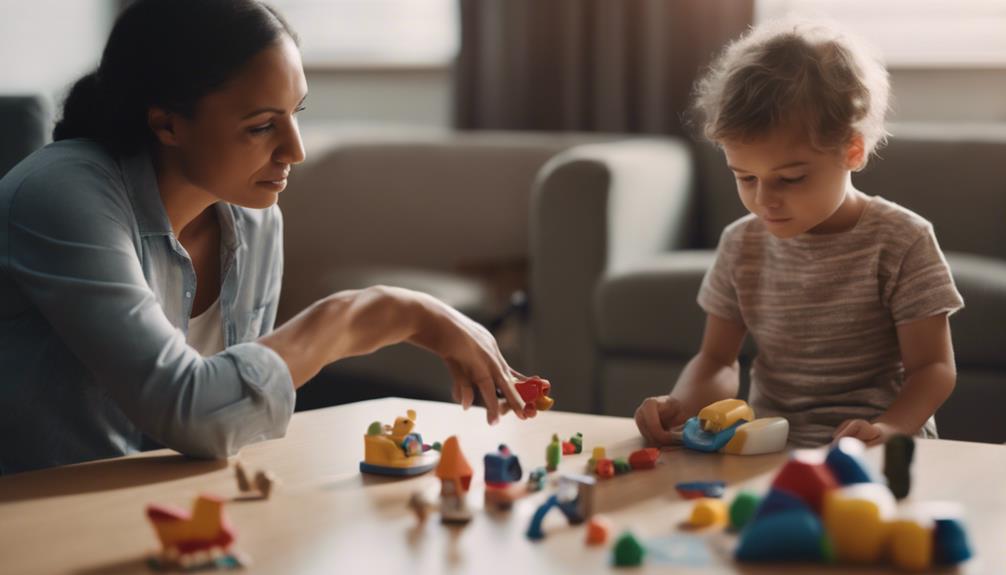
To guarantee proper support and guidance for your gifted baby's development, consider seeking professional advice from experts in pediatric psychology or gifted education. It's essential to consult a pediatrician or child psychologist for an accurate evaluation of whether your baby is gifted.
These professionals can offer tailored recommendations on nurturing your gifted baby's potential. Early identification of giftedness through expert guidance can lead to appropriate support and interventions that cater to your baby's unique needs.
By collaborating with professionals, you can create personalized learning plans that align with your baby's abilities and interests. Seeking advice from experts in gifted education will make sure that you receive the necessary guidance to foster your child's development effectively.
Frequently Asked Questions
How to Tell if a Baby Is Gifted?
To tell if a baby is gifted, observe early language development, high curiosity, strong problem-solving skills, advanced motor skills, and intense focus. Look for quick learning, sensitivity to stimuli, complex toy preference, high energy, and strong memory retention.
How to Identify a High IQ Baby?
To identify a high IQ baby, notice early language skills, quick problem-solving, deep curiosity, strong memory, and focused concentration. Remember, only about 2% of the population fall into the gifted category, so keep an eye out for these signs.
What Are Three Traits That May Suggest That a Child Is Gifted?
When looking for signs of giftedness in a child, notice their early language development, intense focus, and quick learning ability. These traits could suggest exceptional abilities and potential for giftedness in your little one.
Do Gifted Babies Cry a Lot?
Gifted babies may cry more due to heightened sensitivity and advanced cognitive abilities. Their increased awareness and responsiveness can lead to more frequent crying. Understanding the reasons behind their crying can help provide appropriate support.
Conclusion
As you navigate the world of gifted baby characteristics, remember to keep an eye out for those subtle signs that set them apart. Like a hidden gem waiting to be unearthed, these unique traits may require a keen observer to fully appreciate their brilliance.
Stay vigilant, stay curious, and always seek guidance from professionals when needed. The journey of nurturing a gifted child is a rewarding one, full of surprises and endless possibilities.

